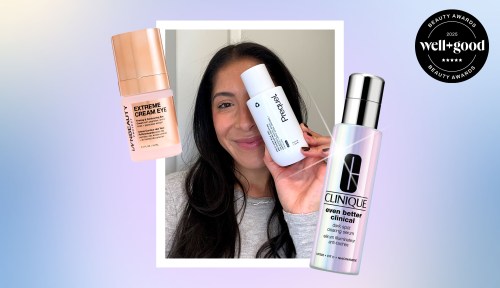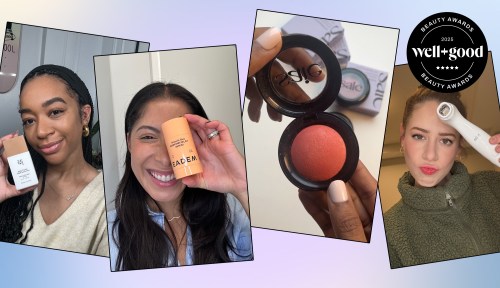Our editors independently select these products. Making a purchase through our links may earn Well+Good a commission
If you’ve ever breathed a sigh of relief upon walking into a clean home or finishing up a deep clean, you know firsthand the powers of a clean, tidy space to alleviate stress and anxiety. Even the physical act of cleaning can feel restorative, helping you gain a sense of control over your environment and clear the clutter that might otherwise cloud your focus.
Experts in This Article
licensed professional therapist, author, speaker, and founder of Struggle Care
president of cleaning company Molly Maid
But, when life happens and more pressing tasks get in the way of regular tidying—cue: the growing pile of dirty laundry or the sea of mail strewn about the coffee table—the thought of cleaning can have just the opposite effect, becoming a veritable source of stress. Enter: what TikTok has dubbed the “Hollywood clean,” a low-maintenance strategy for cleaning your space that doesn’t involve nearly as much effort, energy, or time as a typical clean.
What is the Hollywood clean?
The cheeky term simply refers to a surface-level clean of a space. (Like most things associated with Hollywood, a Hollywood clean is about the good-looking façade.) The key difference between a Hollywood clean and a regular clean, experts say, is simply that the former is much less deep or intensive.
For example, cleaning the bathroom might typically involve polishing the surfaces, washing the floors, and scrubbing and bleaching the tub and toilet, whereas a Hollywood clean is just about getting the room into good enough shape to be functional. Think: a wipe-down of the cabinets and a sweep, so that the space is presentable, rather than perfect.
The key here is good enough versus best. Instead of doing every task on a cleaning checklist, you’re hitting the bare minimum for the room to serve its purpose and be “safe and sanitary,” says therapist KC Davis, LPC, author of How to Keep House While Drowning: A Gentle Approach to Cleaning and Organizing. For example, in the kitchen, this might just look like rinsing dirty dishes or sweeping crumbs and food from the floor. The point is to make cleaning work for you, rather than allow it to mount into a growing source of stress and worry.
The mental health benefits of a surface-level Hollywood clean
A Hollywood clean focuses on clearing away the most visible dirt, debris, and clutter, all of which has been associated with a perception of one’s home as less restorative and restful, and has been shown to have a negative effect on subjective well-being. So, by simply removing surface-level dirt and tidying up just a bit so that things look clean and orderly, you’re creating a home environment that’ll better support your mental health.
The inherent speed of a Hollywood clean can also contribute to its stress-relieving benefits, given that the time it takes to do a typical clean is part of the reason why it can become such a burden. Due to longstanding gender biases, the people who are still doing the lion’s share of household chores are most often those who identify as women—who also take on a disproportionate amount of child-care tasks. A quicker Hollywood clean, then, offers an opportunity for women, in particular, to get more time back for themselves, which is its own mental-health boon.
“[The Hollywood clean] can alleviate the pressure people might otherwise feel to keep their house in tip-top shape.” —KC Davis, LPC, therapist
The trending low-lift clean may also help normalize having a not-perfectly-clean home, which can alleviate the pressure people might otherwise feel to keep their house in tip-top shape, says Davis. “It is a huge [negative] impact to someone’s mental health if they believe that failing to keep a clean home is a moral failure because then, they’ll experience so much shame when life gets tough, and they can’t pull it off,” she says. The Hollywood clean runs counter to that narrative, reinforcing the idea that even a quick-and-easy, surface-level clean is totally fine.
This idea also offers people permission to use their own needs and priorities to dictate how clean and tidy their space will be, adds Davis. Sure, in some cases, you might really want or need to put time and effort toward a deep clean, and that’s great. But at other times, you may need or want to do anything but—and that’s also fine. “Those are the times when we just want to focus on how we can keep our space functional and let go of the rest of it,” says Davis. And that’s where the low-stakes Hollywood clean comes into play.
Perhaps ironically, the more often you Hollywood-clean your space, the less often you may even need to deep-clean it, anyway, because you’re consistently maintaining a certain baseline level of cleanliness, says Marla Mock, president of cleaning company Molly Maid. And the simple fact that you can get away with less frequent deep cleans could be a stress-reducer, in and of itself.
How to Hollywood-clean your space, room by room
Since the Hollywood clean is just about completing only the essential tasks to make a space safe and sanitary, exactly how to do it will vary from person to person, home to home. One person’s version may involve cleaning tasks like sweeping and wiping, while for someone else, it might just be about tidying and putting away loose items.
Davis likes to start by focusing on five key realms in her home: “trash, dishes, laundry, things with a place, and things without a place.” So, that means she’ll take out the trash, clean dishes in the sink, and pop in the laundry before finding a home for things that don’t have one, and putting other items left out on counters or tables back in their designated places. If she wants to keep going, she says, she’ll also vacuum floors and wipe down tables and counters.
“[It’s] this tiered way of thinking about your space where you can just pick whatever level of cleaning matches your capacity at that time.” —Davis
The idea is to tackle the most pressing and visibly dirty areas that prevent you from living comfortably and safely in your space—like food left on the counter, dishes piled in the sink, or trash overflowing. And once you’ve checked those boxes, you can go on to add as many (or as few) tasks to your cleaning list as you’d like.
Approaching housework this way frees you up to make decisions about what’s feasible based on your priorities at any given time. “[It’s] this tiered way of thinking about your space where you can just pick whatever level of cleaning matches your capacity at that time,” says Davis. “This allows you to care for your space while still being able to prioritize things that are more important than a magazine-cover-worthy living room.”
Below, Mock shares a list of tasks to start with for each room, which can be adjusted based on how necessary you deem them in terms of your home’s cleanliness and function:
Bedroom
Make the bed(s) and give any surfaces (like dressers and nightstands) a quick wipe to get rid of dust and dirt. While you’re there, put away anything on those surfaces or on the floor that typically has another resting place.
Bathroom
Give toilet(s) a quick clean with some toilet-cleaning solution and a brush, wipe the shower and tub, sweep the floor, and wipe down the sink and countertop.
Kitchen
Load dirty dishes into a dishwasher or hand-wash them, clear off countertop clutter, wipe appliances and counters with all-purpose cleaning solution, and sweep or vacuum the floor with an eye for crumbs.
Living room
Fluff up any cushions on chairs or couches, sweep or vacuum the floor, and wipe down surfaces like coffee tables.
If you find yourself with extra time and energy to devote to a top-to-bottom clean—and this ranks higher in priority than other tasks on your list—go for it (and better yet, rope in a partner, roommate, or friend to help). But if that sounds like the last task you could manage, also remember that sometimes a bare-minimum clean is more than enough to make your space—and you—feel put-together.
Sign Up for Our Daily Newsletter
Get all the latest in wellness, trends, food, fitness, beauty, and more delivered right to your inbox.
Got it, you've been added to our email list.











